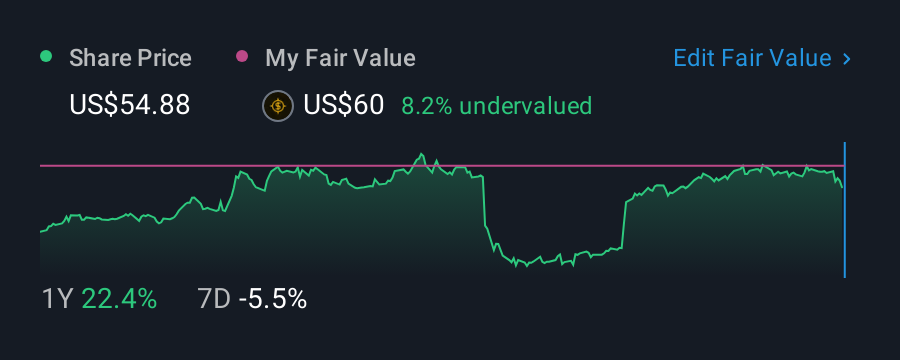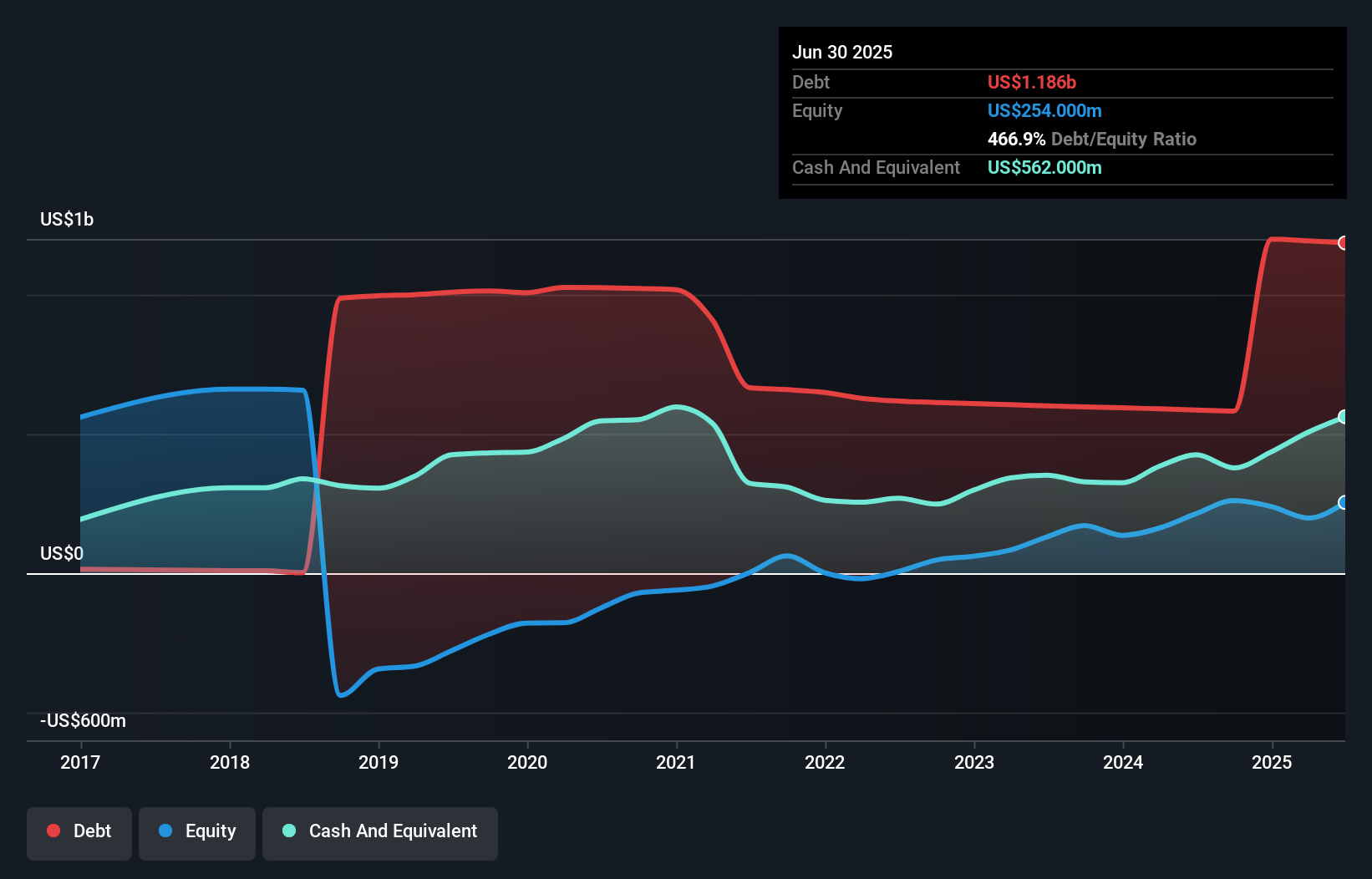- United States
- /
- Consumer Services
- /
- NasdaqGS:FTDR
These 4 Measures Indicate That Frontdoor (NASDAQ:FTDR) Is Using Debt Reasonably Well

Howard Marks put it nicely when he said that, rather than worrying about share price volatility, 'The possibility of permanent loss is the risk I worry about... and every practical investor I know worries about.' So it seems the smart money knows that debt - which is usually involved in bankruptcies - is a very important factor, when you assess how risky a company is. Importantly, Frontdoor, Inc. (NASDAQ:FTDR) does carry debt. But the more important question is: how much risk is that debt creating?
When Is Debt Dangerous?
Debt assists a business until the business has trouble paying it off, either with new capital or with free cash flow. If things get really bad, the lenders can take control of the business. However, a more frequent (but still costly) occurrence is where a company must issue shares at bargain-basement prices, permanently diluting shareholders, just to shore up its balance sheet. Of course, plenty of companies use debt to fund growth, without any negative consequences. When we think about a company's use of debt, we first look at cash and debt together.
How Much Debt Does Frontdoor Carry?
The image below, which you can click on for greater detail, shows that at June 2025 Frontdoor had debt of US$1.19b, up from US$586.0m in one year. On the flip side, it has US$562.0m in cash leading to net debt of about US$624.0m.

A Look At Frontdoor's Liabilities
Zooming in on the latest balance sheet data, we can see that Frontdoor had liabilities of US$416.0m due within 12 months and liabilities of US$1.50b due beyond that. Offsetting these obligations, it had cash of US$562.0m as well as receivables valued at US$21.0m due within 12 months. So it has liabilities totalling US$1.34b more than its cash and near-term receivables, combined.
While this might seem like a lot, it is not so bad since Frontdoor has a market capitalization of US$4.30b, and so it could probably strengthen its balance sheet by raising capital if it needed to. But we definitely want to keep our eyes open to indications that its debt is bringing too much risk.
Check out our latest analysis for Frontdoor
We measure a company's debt load relative to its earnings power by looking at its net debt divided by its earnings before interest, tax, depreciation, and amortization (EBITDA) and by calculating how easily its earnings before interest and tax (EBIT) cover its interest expense (interest cover). Thus we consider debt relative to earnings both with and without depreciation and amortization expenses.
With net debt sitting at just 1.4 times EBITDA, Frontdoor is arguably pretty conservatively geared. And this view is supported by the solid interest coverage, with EBIT coming in at 9.8 times the interest expense over the last year. Also positive, Frontdoor grew its EBIT by 21% in the last year, and that should make it easier to pay down debt, going forward. There's no doubt that we learn most about debt from the balance sheet. But it is future earnings, more than anything, that will determine Frontdoor's ability to maintain a healthy balance sheet going forward. So if you want to see what the professionals think, you might find this free report on analyst profit forecasts to be interesting.
Finally, a company can only pay off debt with cold hard cash, not accounting profits. So the logical step is to look at the proportion of that EBIT that is matched by actual free cash flow. Over the most recent three years, Frontdoor recorded free cash flow worth 72% of its EBIT, which is around normal, given free cash flow excludes interest and tax. This free cash flow puts the company in a good position to pay down debt, when appropriate.
Our View
Frontdoor's conversion of EBIT to free cash flow suggests it can handle its debt as easily as Cristiano Ronaldo could score a goal against an under 14's goalkeeper. And that's just the beginning of the good news since its EBIT growth rate is also very heartening. When we consider the range of factors above, it looks like Frontdoor is pretty sensible with its use of debt. That means they are taking on a bit more risk, in the hope of boosting shareholder returns. There's no doubt that we learn most about debt from the balance sheet. However, not all investment risk resides within the balance sheet - far from it. These risks can be hard to spot. Every company has them, and we've spotted 2 warning signs for Frontdoor you should know about.
At the end of the day, it's often better to focus on companies that are free from net debt. You can access our special list of such companies (all with a track record of profit growth). It's free.
New: AI Stock Screener & Alerts
Our new AI Stock Screener scans the market every day to uncover opportunities.
• Dividend Powerhouses (3%+ Yield)
• Undervalued Small Caps with Insider Buying
• High growth Tech and AI Companies
Or build your own from over 50 metrics.
Have feedback on this article? Concerned about the content? Get in touch with us directly. Alternatively, email editorial-team (at) simplywallst.com.
This article by Simply Wall St is general in nature. We provide commentary based on historical data and analyst forecasts only using an unbiased methodology and our articles are not intended to be financial advice. It does not constitute a recommendation to buy or sell any stock, and does not take account of your objectives, or your financial situation. We aim to bring you long-term focused analysis driven by fundamental data. Note that our analysis may not factor in the latest price-sensitive company announcements or qualitative material. Simply Wall St has no position in any stocks mentioned.
About NasdaqGS:FTDR
Frontdoor
Provides home and new home structural warranties in the United States.
Good value with adequate balance sheet.
Similar Companies
Market Insights
Weekly Picks


Ferrari's Intrinsic and Historical Valuation


Investment Thesis: Costco Wholesale (COST)

Undervalued Key Player in Magnets/Rare Earth
Recently Updated Narratives


Is Global Payments (NYSE:GPN) The Undervalued Cash Cow Your Portfolio Needs?


Broadcom - A Fundamental and Historical Valuation


Hims & Hers Health aims for three dimensional revenue expansion
Popular Narratives


The "Sleeping Giant" Stumbles, Then Wakes Up


NVDA: Expanding AI Demand Will Drive Major Data Center Investments Through 2026






